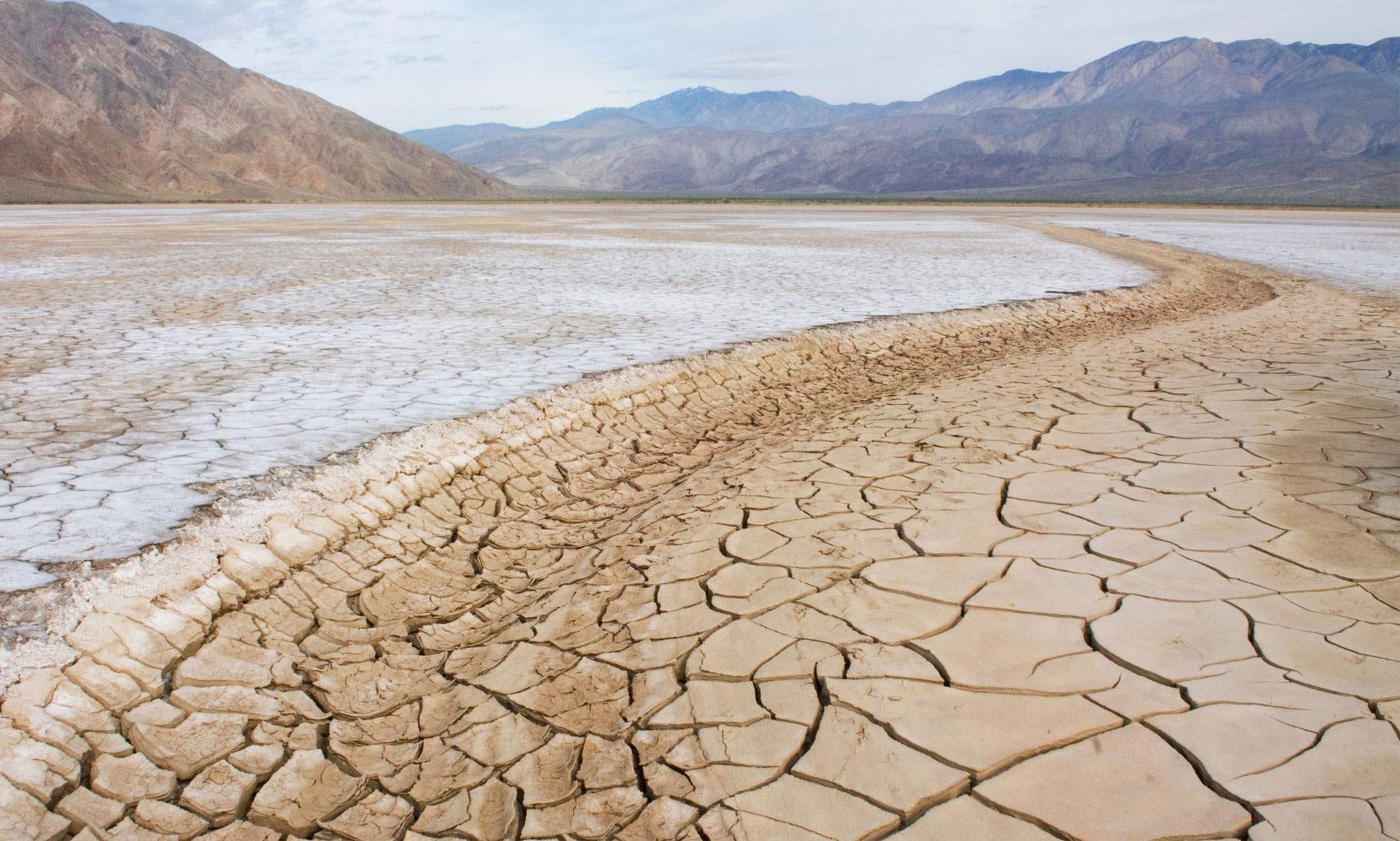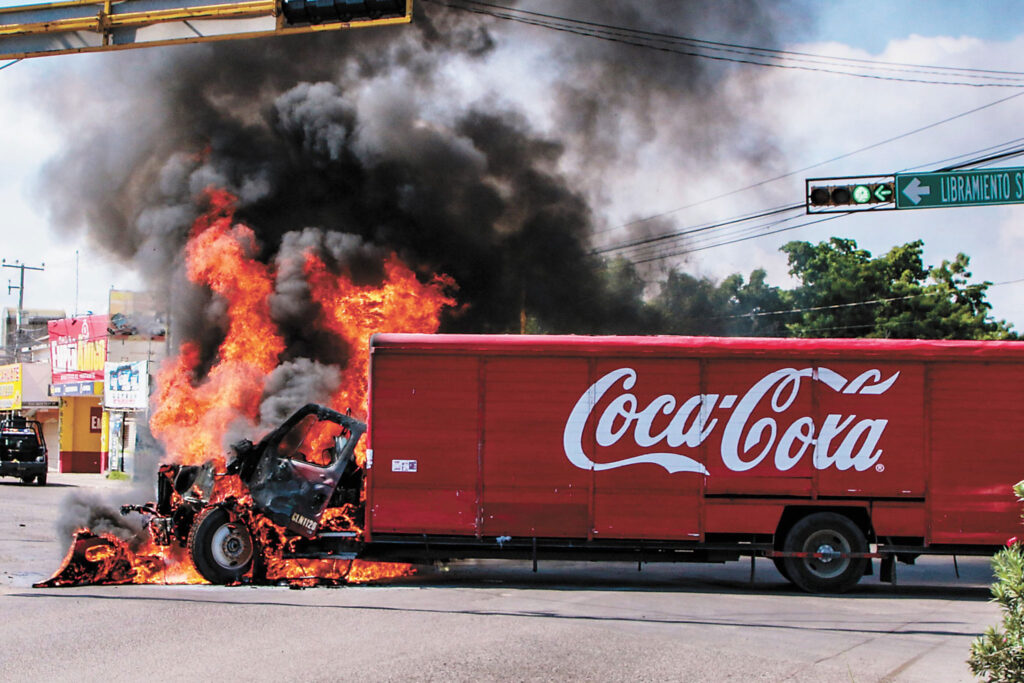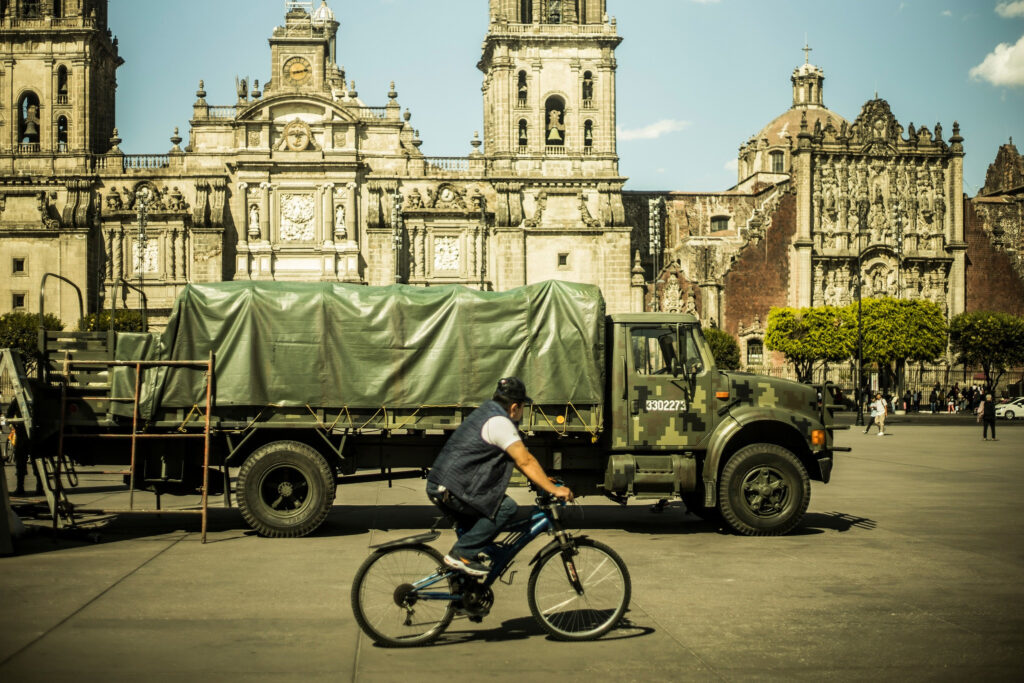80% of Mexico’s Water is Stolen by Corporations & Politicians
This article by Obed Rosas originally appeared in the November 27, 2025 edition of Sin Embargo.
Mexico City. Irrigation companies, large corporations such as Coca-Cola, Lala, Kimberly-Clark, the Peñasquito mine owned by Canadian company Goldcorp , the steel company ArcelorMittal, airports such as the one in Cancun, hotels, entities such as CFE Generación, and a group of politicians are the major water hoarders who persist to this day thanks to the Salinas-era water law.
These large-scale hoarders number 3,304 major concession holders who extract one million cubic meters or more of water per year, according to data from the National Water Commission (Conagua) analyzed up to 2020. Collectively, this 1.1 percent of private users has amassed a volume equivalent to 22.3 percent of all water granted for consumptive use in the country, as explained by academics Wilfrido A. Gómez Arias and Andrea Moctezuma in their research The Water Millionaires.
Furthermore, researcher Elena Burns raises another crucial issue in an interview regarding large-scale water users: 80 percent of the volume allocated for industrial and service uses is neither being declared nor is the corresponding fees being paid. “So, in 2023, 4.3 billion cubic meters were registered in the Public Registry of Water Rights for these two uses. Industrial and service users should be paying 56 billion pesos annually, but they only paid 12 billion pesos. For me, this is the crux of the matter,” says the specialist.
Regarding the political connection, Congressman Alfonso Ramírez Cuéllar, a former member of El Barzón and known for his close ties to President Claudia Sheinbaum Pardo, said on the program Los Periodistas that throughout the country there are “true predators” of water belonging to the political class.
SinEmbargo has documented how politicians from all parties who have governed their states have benefited from concessions to exploit the country’s water resources. This is the case, for example, of Guillermo Padrés Elías (Sonora), Diego Sinhué Rodríguez Vallejo (Guanajuato), Miguel Márquez Márquez (Guanajuato), Jaime Rodríguez Calderón (Nuevo León), Luis Armando Reynoso Femat (Aguascalientes), Francisco Ramírez Acuña (Jalisco), Ángel Aguirre Rivero (Guerrero), Rutilio Escandón Cadena (Chiapas), and also former president Vicente Fox Quesada, who was also Governor of Guanajuato.
Most of these concessions used by politicians are for agricultural use, which uses 48.7 percent of the water granted to these “water millionaires,” a use that is exempt from payment for the exploitation of the resource.
In this regard, Burns suggests adding five proposals to the current water reform being debated in Congress to improve water resource management and water equity. These proposals begin with the need to reallocate water volumes by extinguishing concessions for which the holder has not paid fees. This would help secure the water required for strategic projects and the human right to water, while also protecting small-scale rural users and ending fiscal impunity. A second proposal is to register the water rights of Indigenous peoples, community systems, and agrarian communities, even those without available water, and dedicate reallocated volumes to fulfilling these rights. This would allow the National Water Law (LAN) to comply with the rights established in the General Water Law (LGA).
Third, he proposes classifying water pollution as a water-related crime against public health, which would strengthen the new chapter on “Water Crimes” and demonstrate a commitment to taking serious measures against pollution. The fourth proposal is to explicitly prohibit the privatization of water. Finally, he spoke of demanding the reconstruction of the Basin Councils to guarantee the inclusion of Indigenous peoples, community systems, agrarian communities, researchers, human rights defenders, and communities affected by pollution, ensuring that those most affected in their water rights have a voice and helping to correct discrimination and corruption by officials at the National Water Commission (Conagua). “Currently, they are controlled by large concessionaires like FEMSA, Coca-Cola, pig farms, palm oil companies, and so on,” he denounces.
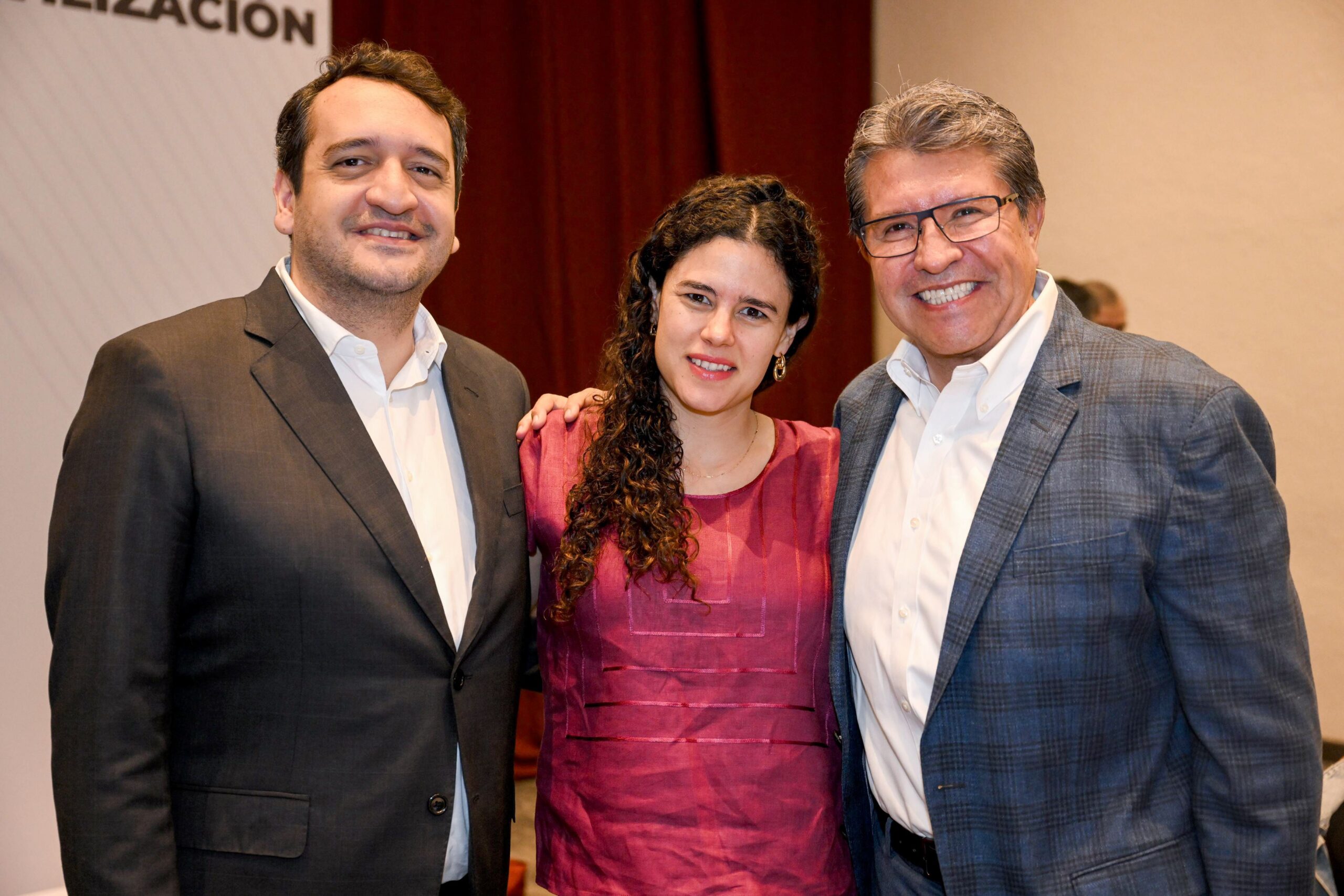
Politicians’ Water Concessions
A particular case of the benefit that the political class has had with water concession titles is that of the Monreal family, the political clan of Zacatecas that owns various water concessions for agricultural use in an overexploited aquifer of the state, according to CONAGUA.
The data in this case shows that Father Felipe Monreal Huerta (deceased in 2002), as well as the Governor of Zacatecas David Monreal, Senator and former mayor Saúl Monreal, Cándido and Elías Monreal Ávila – all brothers of Morena Deputy Ricardo Monreal Ávila – have obtained concessions for “agricultural use” and “different uses” between 1999 and 2020.
Last Tuesday, Congressman Alfonso Ramírez Cuéllar denounced that among the “predators” and “big water hoarders” who oppose the General Water Law initiative and the reform to the National Water Law promoted by President Claudia Sheinbaum, there are even people who have recently joined Morena.
The congressman singled out specific groups, such as the LeBarón family in Chihuahua and Sonora, whom he called “true predators.” “If you go to Chihuahua, everyone knows who the water predators are. This is upsetting because there are other farmers who want their questions answered, and we are reaching out to them. I think the government should publish the list of everyone who is stealing water and who has illegal wells. Enough is enough.”
“There are some who recently joined Morena. It’s a disgrace. They’ve always stolen water. They’ve always trafficked in water in Chihuahua. I don’t know who got them into Morena, but it’s a disgrace,” the legislator declared.
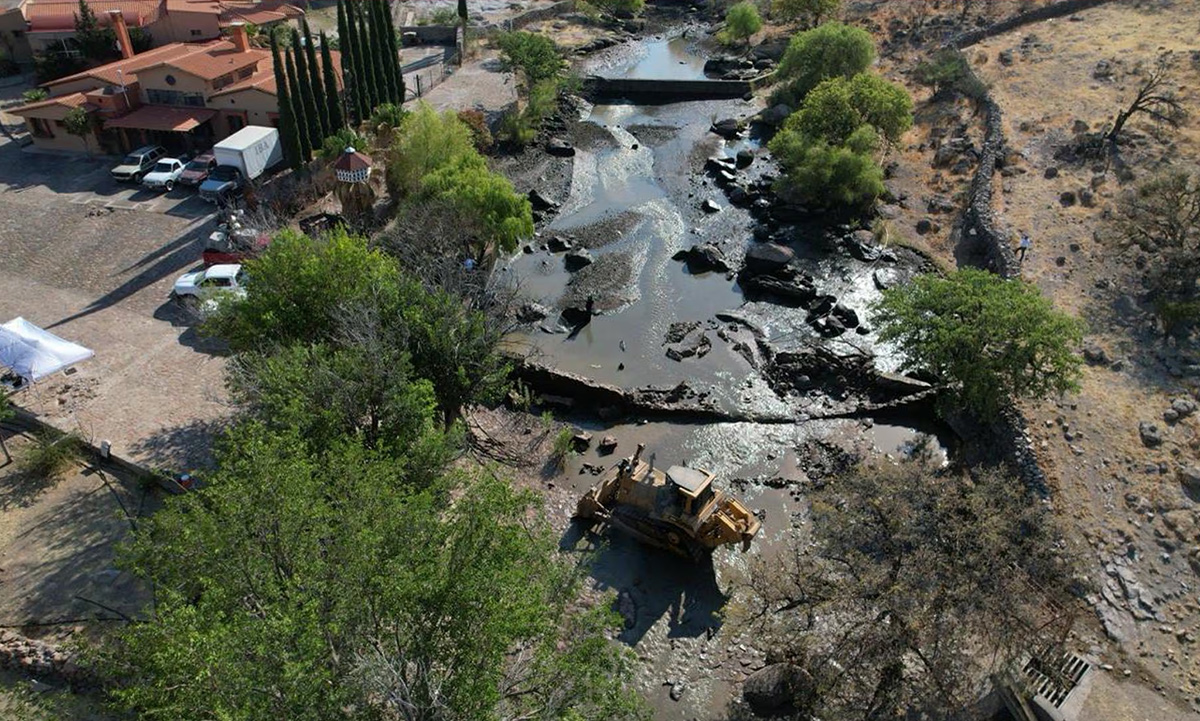
SinEmbargo has documented how a water mafia in Chihuahua, comprised of former state officials from the National Water Commission (Conagua), has allowed—through lawsuits, falsified concession titles, and the trafficking of official documents—an alleged front man for former PRI governor César Duarte to overexploit the Llano de Gigantes aquifer for pecan production. This network has also enabled Mennonite farmers and the La Norteñita agro-industrial apple producer to overexploit the Laguna Santa María aquifer, according to the state citizen oversight committee.
In Sonora, for example, the family of former governor Guillermo Padrés Elías has, according to the Public Registry of Water Rights (REPDA), six concession titles in the name of Guillermo Padrés Dagnino, son of the former PAN governor, and Miguel Padrés Molina, nephew of the former governor.
Also in the north of the country, former Nuevo León governor Jaime Rodríguez Calderón owns an ejido (communal land) in Paredón, Coahuila. For agricultural use, he has access to 184,000 m³/year of groundwater, which he received from Conagua (National Water Commission) in November 2006, when he was already a local PRI (Institutional Revolutionary Party) representative and years later would become Mayor of García; and in October 2020, when he was Governor, he obtained another concession, according to the Repda (Public Registry of Water Rights).
In Aguascalientes, the same data from the Public Registry of Water Rights shows how Luis Armando Reynoso Femat, a member of the PAN party, who is facing charges for tax fraud as well as embezzlement and misuse of public office, along with his siblings Graciela, Felipe, Laura, Olga Irene, Lourdes, and Óscar, holds three agricultural water use concessions granted between 1996 and 1998, allowing him more than 200,000 m3 per year for each of the titles.
In Jalisco, former governor and current PAN Senator Francisco Ramírez Acuña holds an agricultural water use concession he obtained in 1999, two years before assuming the governorship and while serving as Mayor of Guadalajara. This concession allows him to use 25,000 cubic meters of groundwater annually from the Lerma-Santiago-Pacific Basin.
Meanwhile, in Guanajuato, three former PAN governors and their families hold various water concessions. This is the case of the family of former president Vicente Fox Quesada, who enjoy 18 concessions in San Francisco del Rincón, Guanajuato. These concessions allow him to supply water to his various companies at a special price, thanks to a government subsidy that should be allocated only to small producers. Miguel Márquez Márquez and Diego Sinhue Rodríguez Vallejo are also among those listed.

The Water Millionaires
The report Water Millionaires reveals that among the 3,000 large private users who monopolize the concessions granted by CONAGUA are Kimberly Clark and Banco Azteca, companies owned by millionaires Claudio X. González Laporte and Ricardo Salinas Pliego, as well as FEMSA, Bachoco, Herdez, Lala, the mining companies GoldCorp, and Buenavista of Grupo México, owned by another millionaire, Germán Larrea Mota-Velasco, according to the study by the Metropolitan Autonomous University (UAM, 2020).
Water grabbing is facilitated because the law does not establish a limit on the volume of water that can be granted to a private entity within the available limits. Furthermore, a user can hold multiple concessions in the names of relatives, partners, or front men, as is the case with the Tricio family of Lala and Coca-Cola, the report notes.
Regarding José Manuel Tricio Cerro and his family, shareholders of Grupo Industrial Lala, although the volume registered in his name is 3.8 hm³/year, if the concessions of other Grupo Lala shareholders are included, the total volume rises to 38 hm³/year. Lala has been accused of overexploiting water in the Comarca Lagunera region, which has led the local population to extract water with high arsenic content for domestic use.
As for the Coca Cola Group, which includes Bebidas Mundiales and Bepensa, the volume granted plus that of its other users (such as Embotelladora del Nayar, Servicios Refresqueros del Golfo y Bajío, etc.) is 39.4 hm³/year, and it has been denounced for overexploiting aquifers in Chiapas and Tlaxcala.
Furthermore, the report highlights the environmental damage caused by these “water millionaires”.
ArcelorMittal, the world’s largest steelmaker, extracts 100.5 hm³/year of water in Mexico (divided among three users: ArcelorMittal Las Truchas, ArcelorMittal México, and ArcelorMittal Servicios Minero Metalúrgico de Occidente) for steel production. Its water extraction has generated constant complaints from communal landowners (ejidos) regarding pollution and land dispossession.
Kimberly-Clark, owned by Claudio X. González Guajardo, which manufactures cleaning, hygiene, and personal care products, has a concession for a volume of 27.3 hm³/year of water and has been accused of polluting rivers and springs in Veracruz, Querétaro, and Michoacán.

The Peñasquito mine, owned by the Canadian company Goldcorp, has been accused of polluting water bodies in Zacatecas. Meanwhile, Buenavista del Cobre, owned by Grupo México, is also accused of pollution and has concessions for 53 hm³/year (61% for industrial use and 39% for other uses), which apparently allows them to avoid paying the higher rate for industrial use.
The report indicates that these “water millionaires” have a strong presence in the exploitation of groundwater, using 47.2% (5,024 hm³/year) of the total of this type of water granted to large users, and are located in 99 of the 115 overexploited aquifers in the country.
“They take, they trade, they steal”
Oxfam Mexico’s report, Profits on the Run, reveals that despite water being the property of the nation and a human right, the legal and institutional system in Mexico has allowed it to become a commodity that accumulates in the hands of a few. This pattern of “they take, they trade, they seize” is clearly exemplified in water concessions.
This report identifies the 10 concession holders that extract the most water for agricultural use. The largest, for example, is the Candelaria Irrigation Unit (Campeche), which is the leading extractor of water for agricultural use in the entire country. The amount it extracts is equivalent to eight times what all the people in the state of Campeche use for domestic purposes.
Oxfam also illustrates the magnitude of this hoarding by indicating that a person would have to live 12 million years to use up the water that agricultural companies extract in Campeche in one year, using the daily limit contemplated by law as a reference.
It also mentions that eight of the ten largest water extractors nationwide for service use are related to tourism or construction. Seven of these concessions are located in Quintana Roo.
The ten concession holders that extract the most water for service use are:
- Cancun Airport, SA de CV. Oxfam estimates that if a person were to take a bath with the amount of water this entity uses in a year, the shower would last for 4,000 uninterrupted years.
- Quiroocan SA de CV. This company is owned by Simón Pedro Barceló, who was ranked as the 21st richest person in Spain in 2024. To consume the amount of water Quiroocan uses in a year, a person would have to live 340,000 years.
- Promociones y Desarrollos Ribera Mujeres, SA de CV.
- Balneario Ojo del Carbón; Tlapanala, Puebla, S. de RL.
- Hotelera Playa Paraíso, SA de CV.
- Urbi Construcciones del Pacífico, SA de CV.
- Promotora Ecotur SA de CV.
- Inmobiliaria Xcunya SA de CV.
- Desarrollo Marina Vallarta, SA de CV.
- Government of the State of Morelos.
Despite the exorbitant water withdrawals for services, the water extracted by the Candelaria Irrigation Unit (agricultural use) is eight times greater than that used annually by the Cancun Airport.
International corporations have been accused worldwide of buying land containing bodies of water and profiting from water use rights, speculating on its scarcity in the context of the climate crisis.
The same report mentions that CFE Generación IV EPS is the main water extractor for industrial use, supplying multiple power plants where the water used cannot be reused. The amount of water this entity extracts annually would be enough to supply the Iztapalapa borough in Mexico City for 15 and a half years.
Other concessionaires that extract water for industrial use include Proyectos Hidroeléctricos de Puebla, SA de CV, several entities of the Federal Electricity Commission (such as Campo Geotérmico Cerro Prieto, BC and Central Termoeléctrica “José López Portillo”, Coah.), ISPAT Mexicana, SA de CV, Agroindustrias del Balsas, SA de CV, CPI Internacional, SA de CV, Geotérmica para el Desarrollo, SAPI de CV, and Arcelormittal México, SA de CV.
Oxfam highlights that banks have engaged in water grabbing, which points to the financialization of a human right. It notes that both banks and international corporations acquired a total of 183 water concessions for agricultural use as of September 2024.
The report denounces that this practice contravenes the Constitution (Article 27, section V), which establishes that banks cannot own land or water that is not essential for their economic purposes.
The truth is that international corporations have been accused worldwide of buying land containing bodies of water and profiting from water use rights or services, thus speculating on its scarcity in the context of the climate crisis.
Oxfam concludes that the current weak regulations in the National Water Law allow for the legal hoarding of water, while millions of people suffer from water insecurity. Furthermore, this problem disproportionately affects women, who, bearing the brunt of caregiving responsibilities, must walk to collect water or care for sick relatives due to contamination or scarcity. The State’s inability to properly measure and monitor water extraction and use contributes to the problem.
Obed Rosas is the editor of the Investigative Unit and head of the Books section at SinEmbargo, where he has also served as Desk Manager and Social Media Editor. He hosts Close UP and co-hosts Siete Días with Álvaro Delgado
-
The Diabetes-Cola Cup
In this dystopian world, in the most “Coca-colonized” country on the planet, the construction of toxic advertising environments relies on corruption and the power of large corporations. In the case of FIFA, corruption is an integral part of the institution.
-
Mexico at the Crossroads: Sovereignty, Solidarity, & the Pressure of a Powerful Neighbor
Mexico is buying time—but the costs of that strategy are rising, writes Teri Mattson.
-
In Five Years, Mexican Parasites Doubled Fortunes
Not due to individual merit, but because of an unjust economic model that depends on the labor of millions and the resources of the entire national territory, warned Oxfam México.

